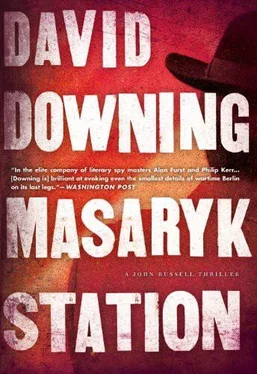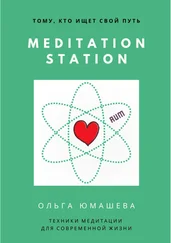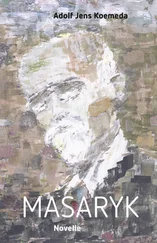David Downing - Masaryk Station
Здесь есть возможность читать онлайн «David Downing - Masaryk Station» весь текст электронной книги совершенно бесплатно (целиком полную версию без сокращений). В некоторых случаях можно слушать аудио, скачать через торрент в формате fb2 и присутствует краткое содержание. Год выпуска: 2013, ISBN: 2013, Издательство: Soho Press, Жанр: Шпионский детектив, на английском языке. Описание произведения, (предисловие) а так же отзывы посетителей доступны на портале библиотеки ЛибКат.
- Название:Masaryk Station
- Автор:
- Издательство:Soho Press
- Жанр:
- Год:2013
- ISBN:9781616952228
- Рейтинг книги:4 / 5. Голосов: 1
-
Избранное:Добавить в избранное
- Отзывы:
-
Ваша оценка:
- 80
- 1
- 2
- 3
- 4
- 5
Masaryk Station: краткое содержание, описание и аннотация
Предлагаем к чтению аннотацию, описание, краткое содержание или предисловие (зависит от того, что написал сам автор книги «Masaryk Station»). Если вы не нашли необходимую информацию о книге — напишите в комментариях, мы постараемся отыскать её.
Masaryk Station — читать онлайн бесплатно полную книгу (весь текст) целиком
Ниже представлен текст книги, разбитый по страницам. Система сохранения места последней прочитанной страницы, позволяет с удобством читать онлайн бесплатно книгу «Masaryk Station», без необходимости каждый раз заново искать на чём Вы остановились. Поставьте закладку, и сможете в любой момент перейти на страницу, на которой закончили чтение.
Интервал:
Закладка:
‘For the moment. There were a few walk-outs at different sites last week, but we got everyone back, and then called meetings. The vote for a strike was almost unanimous.’
‘When?’
‘Monday.’
‘And what do you expect the Russians to do?’
‘Arrest the leaders. At the very least. Beyond that …’ Pieck shrugged. ‘You get to a point where that doesn’t matter.’
Strohm knew the script, knew what he was supposed to say. But if he hadn’t yet reached Pieck’s point, he knew it wasn’t that far away. Those were workers filling their lungs with poison, at the strident behest of the one and only workers’ state, his and Pieck’s guiding star for all their adult lives. Workers that they were supposed to represent. Pieck was doing exactly that, and so who the hell was he speaking for?
‘I understand,’ was all Strohm said. ‘I’ve been sent to tell you that the bigger picture’s all that matters, that the Russians will get their uranium one way or another, that all in all you might as well save your strength for battles you can win. Okay? If you’d like a well-honed excuse to change your mind and take the easy way out, there’s no shortage. There never is. And as a gesture of the people’s appreciation the leadership will probably give you a fucking car.’
Pieck looked at him, a smile creasing his mouth. ‘They gave it to you?’
‘God no, this is just a loan. But if you call off the strike …’
‘Not a chance.’
‘I’m glad to hear it. I never liked cars.’
They parted almost friends, but Strohm’s sense of well-being was fleeting. After dropping in on Abakumov, and ingenuously reporting that he’d done all he could, he continued on towards Chemnitz. It was early evening by the time he arrived, but the thought of driving home to Annaliese seemed infinitely preferable to hours spent shuffling doubts in a hotel room.
It wasn’t much better alone with his thoughts on the empty autobahn. Somewhere between Dresden and Lubben Strohm became aware of tears streaming down his cheeks, and pulled the car on to the hard shoulder. The last time he’d cried like this he’d been twelve years old, and both his parents had just died in a Californian road accident. And that was the clue, he realised. That was the last time he’d felt such a crushing sense of loss.
Out at Wannsee the weather was poor, and Russell, Effi and Rosa spent most of Saturday cooped up in the hotel. Between venturing out for meals and one shower-drenched walk along the lakeshore, they read and listened to the wireless. The post-Goebbels range of music was something to be welcomed, although the lack of news reports was surprising; someone had apparently decided that Berliners already had a surfeit, and so had sent all the journalists home for the weekend. Effi utilised an hour of big band music to teach Rosa some basic dance steps, and with Hollywood in mind Russell gave the two of them a lesson in American English. ‘You’re so cute,’ they told each other, before collapsing in a fit of giggles.
The sun came out on Sunday morning, and they took to the water in a rented boat. Every few minutes an American plane would roar above their heads as it headed into Tempelhof, while a few miles to the north British planes were flying in and out of their airbase at Gatow. When Rosa asked why, Russell did his best to explain the situation, and saw its essential craziness reflected in her expression. He sometimes thought they should be more open with her about their own problems, but how did you tell an eleven-year-old that Daddy’s Russian friend might at that very moment be enduring torture at the hands of his Moscow employers?
That evening they were eating outside when another sharp and violent shower erupted, beating a thunderous tattoo on the roof of the covered terrace and drawing a pulsating curtain of rain across the world beyond. Sitting there, Effi felt like she was a taking part in a scene from a film, and that if only the director would shout ‘cut’, someone would then switch the rain machine off.
Sacrificial wolf
Monday morning Strohm took Annaliese to work in the car. They had used it twice the previous day, once to visit her former boyfriend’s parents out in Spandau, and once for a ride around the city. Strohm had felt a little uneasy, but they had paid for the petrol, and-as Annaliese said-what use was a parked car? As the better driver, she had done most of the driving, and this had given him ample opportunity to notice the facial reactions of the people they passed. Some had looked envious, some resentful, a few had simply smiled. It was a beautiful vehicle, after all.
Strohm was behind the wheel that morning. ‘I could get used to this,’ she said, as they passed a crowded tram stop.
‘I’m sure we’ll have one eventually,’ he told her. ‘I expect every family will.’
She made a face. ‘I forgot to tell you-last week at the hospital one of the ambulance drivers told me about this, er, this painting, it’s on a wall in Link Strasse-you know where that is?’
‘It’s one of the streets off Potsdamerplatz.’
‘Yes. It’s in the American zone, but only a few hundred metres from the Russian, which I guess is why they chose it.’
‘Who? What is it?’
‘You must have played Monopoly?’
‘Of course.’
‘Well, someone has painted the board on the wall of a bombed-out house. It’s big. It must have taken him all night. Or her, I suppose.’
‘What for?’
‘Ah, there’s a twist. But I won’t spoil the surprise. You should drive past it on your way to work. Today, before the Russians get permission from the Americans to wipe it away.’
After dropping her at the hospital entrance, Strohm did as she suggested. The giant monopoly board was too large to miss and exquisitely detailed, but for a moment he couldn’t see the point. And then he did-the three most expensive properties had new names. Unter den Linden had become Wall Strasse, where the KPD Central Committee had its headquarters, and Grunewald had turned into Bernicke, where the same institution had its luxurious rest home. Insel Schwanenwerder, the most expensive square of all, now bore the name Seehof, where the Party had just opened an even more exclusive resort for the use of Senior Members of the Central Secretariat.
Strohm stared up at the wall, awed by the sheer amount of effort that he, she or they had put into making this oh-so-simple statement, knowing only too well that its life would be measured, at best, in days. He was indeed surprised to find it still there-if the higherups knew about it, a squad of cadres would have been sent to expunge it over the weekend, American permission or not. But surely some Party members must have seen it. A delicious possibility crossed Strohm’s mind, that those comrades who had seen the painting had failed to report its existence. And that could only be because they felt the same way he did, that he wasn’t alone, with his doubts and sense of loss.
If Strohm had had a camera, he’d have taken a picture, and sent it to the Neue Zeitung . Maybe someone already had.
He was still smiling when he reached his office, and found that Marohn had asked for him. He went upstairs expecting criticism of his conduct in Aue, but his boss had other things on his mind. Did Strohm know that General Sokolovsky, the head of the Soviet Military Administration, had written a letter to his Allied counterparts more or less claiming Soviet control over the whole of the city?
Strohm said he hadn’t. ‘Has there been a reply?’
‘Not yet,’ Marohn conceded, ‘but maybe the Western allies really will leave. Then we can get back to running a railway.’ He was clearly in a good mood-‘at least you tried’ was all he said about the trip to Aue. The only time Strohm felt disapproval was when he said he’d brought back the Horch.
Читать дальшеИнтервал:
Закладка:
Похожие книги на «Masaryk Station»
Представляем Вашему вниманию похожие книги на «Masaryk Station» списком для выбора. Мы отобрали схожую по названию и смыслу литературу в надежде предоставить читателям больше вариантов отыскать новые, интересные, ещё непрочитанные произведения.
Обсуждение, отзывы о книге «Masaryk Station» и просто собственные мнения читателей. Оставьте ваши комментарии, напишите, что Вы думаете о произведении, его смысле или главных героях. Укажите что конкретно понравилось, а что нет, и почему Вы так считаете.












